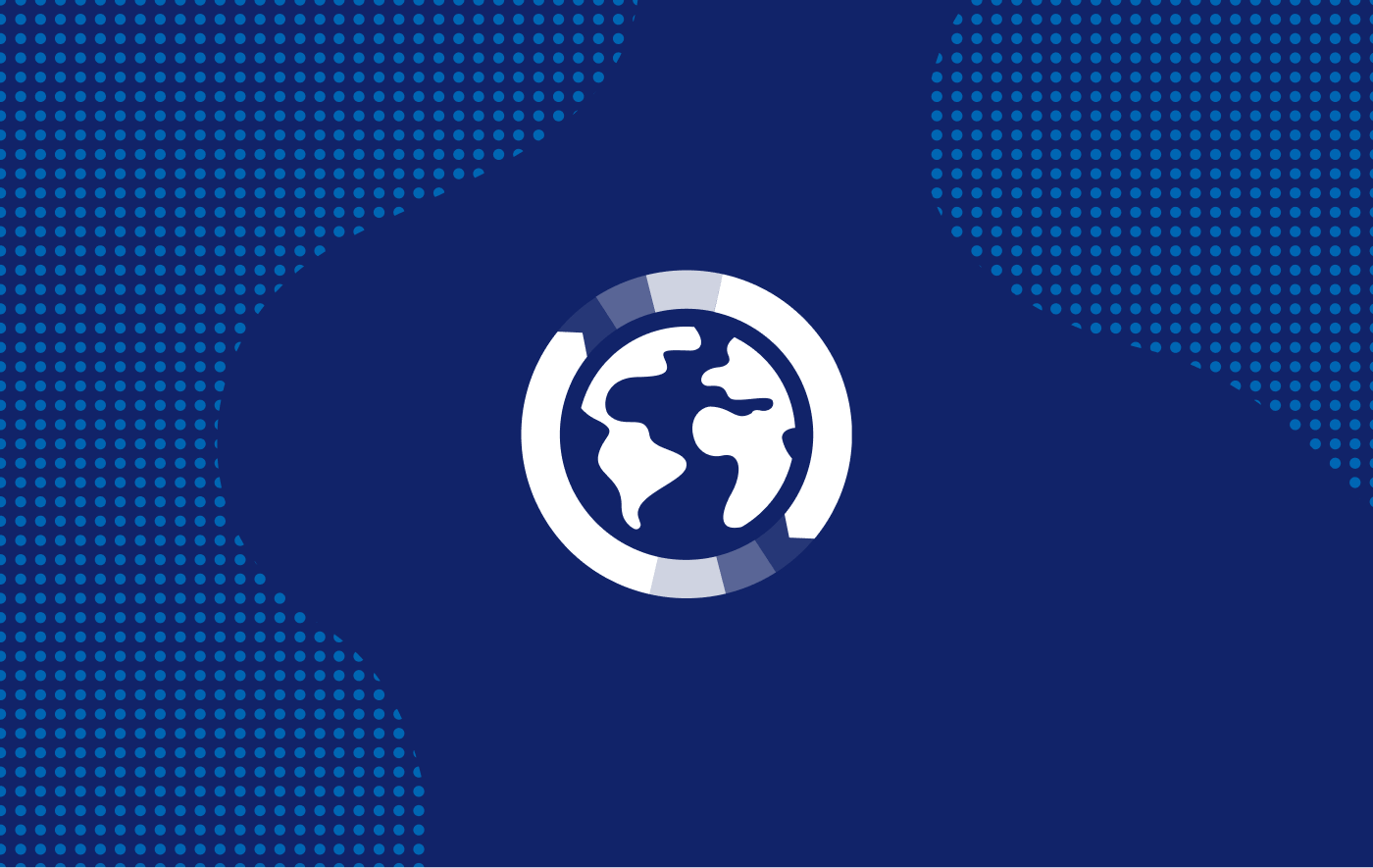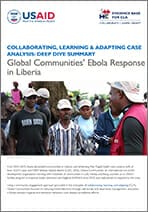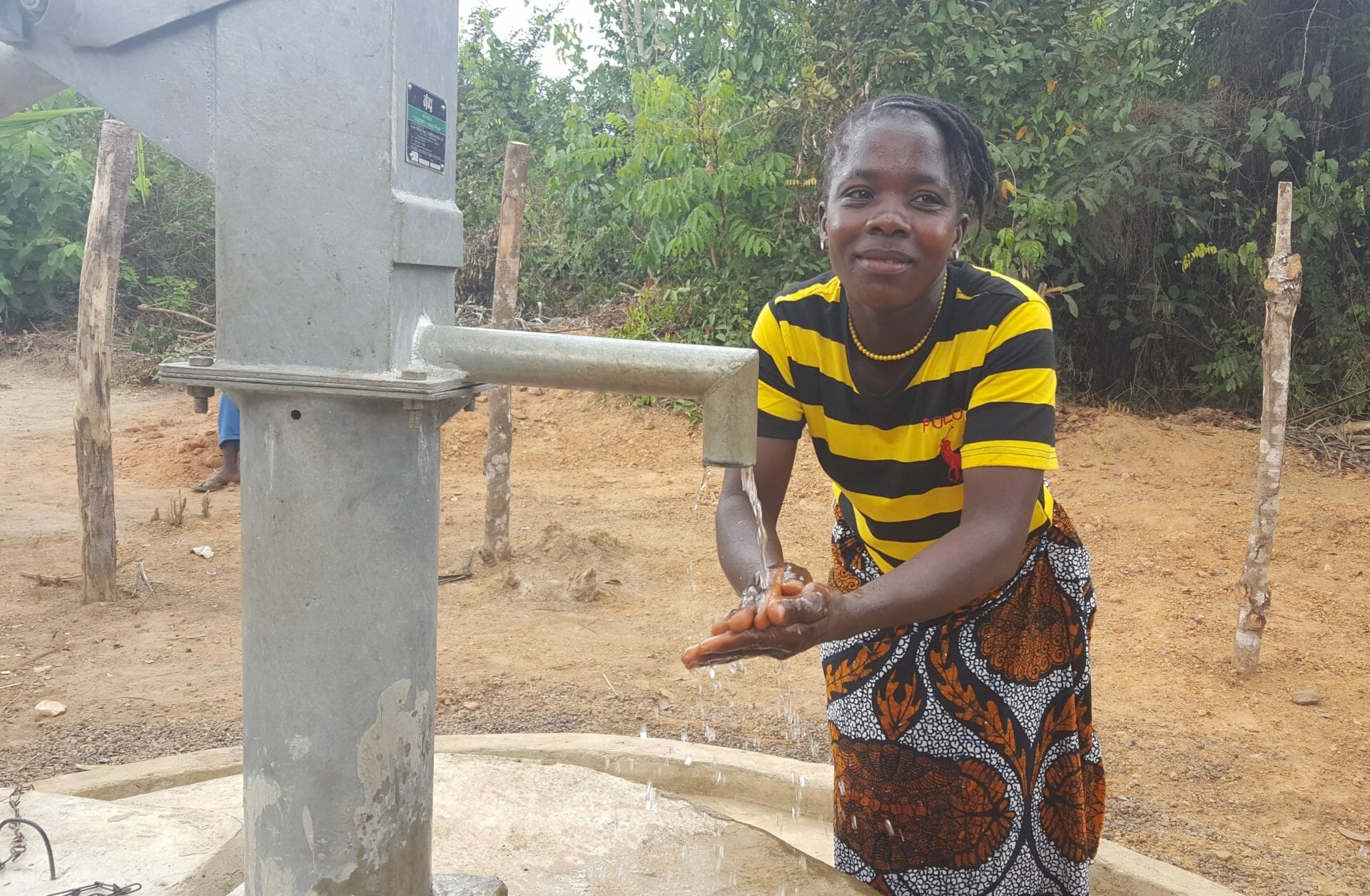Since 2004, Global Communities has built trust with local communities in Liberia while implementing multi-sectoral relief, recovery and development programs designed to leverage and strengthen local capacity. The most notable challenge faced by Liberians in the past decade was the Ebola virus outbreak of 2014. Global Communities’ longstanding presence in-country and close relationships with local government at the county and national levels, Community Health Workers, Environmental Health Technicians, U.S. Agency for International Development (USAID) and the communities we worked with allowed us to quickly respond and refocus activities. When Ebola first crossed into Liberia from Guinea, we worked with the Government of Liberia and our network of community institutions to mount effective public awareness campaigns about the virus and trained clinic staff and Environmental Health Technicians to prevent transmission and strengthen clinical service provision. We complemented that work with the delivery of personal protective equipment, soap and disinfectants to clinics and hospitals.
Global Communities’ response approach evolved as the epidemic expanded, and we continued community engagement to counter Ebola denial and promote safe health behaviors, building on more than five years of implementing water and sanitation activities to bring communities to open defecation free (ODF) status in Bong, Lofa and Nimba counties. The Government of Liberia asked us to support contact tracing, and we further adapted into all 15 counties of the country to provide safe and dignified burials to reduce the risk of community transmission. Global Communities, then working as PCI, also built upon its years of implementing maternal and child health and food/nutrition security programing in several counties, pivoting the work with women’s groups to address emergency needs at the grassroots level. This work focused on community health education/behavior change communication, contact tracing and surveillance, and provision of critical emergency food security assistance as well as non-food items.
Global Communities also supported the Government of Liberia in its health system strengthening and clinical support and restoration efforts by establishing and managing three Ebola Community Care Centers, including the Ganta Ebola Treatment Unit – the country’s only treatment unit primarily staffed by the Ministry of Health and Social Welfare. Liberia was declared Ebola-free in 2016, but unfortunately, that is not where the country’s challenges ended, as the outbreak impacted all sectors of the economy. Global Communities continued to implement health, sanitation and hygiene and economic development programs through 2019. Now, the COVID-19 pandemic presents new evolving challenges in Liberia.
Many Liberians continue to encounter roadblocks in economic growth and expansion, including limited access to markets, economic opportunity and education. Our experience in economic development through locally appropriate market-based solutions provides a springboard for local communities to realize sustainable economic growth. In addition, Global Communities’ robust experience in integrated health system strengthening, as well as sanitation and hygiene programming, provides a strong platform for improving health access and behavior change needed to fight COVID-19 and improve overall community health.
Looking forward, Global Communities is committed to working with Liberians to contribute to the country's economic recovery and resilience, particularly regarding access to markets for agricultural producers and access to economic opportunity for youth, women and Ebola survivors; support and expand sanitation and hygiene programs; and support physical and mental health and wellness programs with an emphasis on at-risk youth and women.
550,000+
Liberians directly reached through Ebola-related interventions, and hundreds of thousands more indirectly
$3.8+ million
worth of medical and sanitation supplies shipped to Liberia in response to the Ebola outbreak
302,000+
individuals reached with public education tools such as films, public service announcements and radio
Recent Programs
Improving Health and Sanitation Practices Through Community Engagement
Global Communities implemented the Partnership for Advancing Community-Based Services (PACS) program from 2015-2019 to improve sanitation practices and access to safe water, sanitation and hygiene (WASH) services, building on the success of our previous Improved Water, Sanitation and Hygiene (IWASH) program funded by USAID from 2010-2015. PACS adopted the innovative Community-Led Total Sanitation Plus approach developed under the IWASH project to continue working toward a greater number of open defecation free communities. By the end of the program, 1,225 communities were verified as open defecation free. Global Communities also improved sanitation coverage by facilitating community construction of individual household latrines and hand-washing facilities used by more than 570,000 people; trained and certified more than 2,800 “Natural Leaders” to guide their communities toward open defecation free status and support their communities in maintaining this status; ensured safe drinking water coverage for more than 40,000 community members by supporting the installation of 135 new hand dug wells with pumps; and trained 135 Community WASH Committees to operate and maintain WASH facilities, specifically communal wells.
Through PACS, Global Communities continued to recruit and train WASH entrepreneurs, building on the success of the previous IWASH program, where local entrepreneurs were trained to fix wells and pumps and market their services to communities in the future. As the Ebola crisis worsened and the need for WASH services grew, these locally-based entrepreneurs proved they were more cost-effective and able to more quickly access clinics than pump mechanics from larger towns farther away. Based on WASH entrepreneurs’ demonstrated effectiveness, private sector donors joined forces with Global Communities to support the model. By providing a market-based model for WASH services, gains made through infrastructure investments and health programming can continue to grow independently even after donor-funded programs are complete. (closed in 2019)
Our Work in Liberia
Emergency WASH
Linking Disaster-Affected Communities with Water and Sanitation
HIV/AIDS & Infectious Diseases
Preventing the Spread of Infectious Diseases
Sanitation & Hygiene
Advancing the Goal of Clean Water for All
Nutrition
Evidence-Based Interventions for Better Nutrition
Employment & Job Training
Supporting Inclusive Economic Growth
Expanding Economic Opportunity
Supporting Small and Medium-Sized Businesses and Community Savings and Lending Groups
Gender Equality & Social Inclusion
Lifting Marginalized Voices and Investing in Women as Leaders and Men as Allies
Health
Combating Disease, Improving Nutrition, and Ensuring Healthy Mothers, Children and Adolescents
Economic Opportunity
Advancing Job Training and Market Linkages for Sustainable Livelihoods
Resilience
Enhancing Food Security, Sustainable Agriculture and Water Management in Climate-Affected Communities
Water Security
Expanding Safe, Sustainable Water Access
Resources
Capacity Materials
CLEAR Cooperative Resilience Research
Global Communities through the USAID Cooperative Development Program -Cooperative Leadership Engagement Advocacy and Research (CLEAR) program, partnered with the United States International University – Africa (USIU-A) to conduct a 5-year longitudinal research study on the dynamics of social capital within the context of agricultural cooperatives in Kenya.
Research & Publications
Cooperative Resilience Longitudinal Study in Kenya
Global Communities through the USAID (United States Agency for International Development) Cooperative Development Program (CDP) known as Cooperative Leadership Engagement Advocacy and Research (CLEAR) project, partnered with the United States International University-Africa (USIU-A) to conduct a five-year longitudinal research study on the dynamics of social capital within the context of agricultural cooperatives in Kenya. Cooperatives…
Briefs & Case Studies
Cooperative Development (CLEAR+) Program Project Brief
Global Communities’ Cooperative Leadership Engagement Advocacy and Research (CLEAR)+ project (2023-2028), is a USAID funded Cooperative Development Program (CDP) aimed at advocating for the development of worker cooperatives with a focus on youth employment. CLEAR+ promotes the cooperative enabling environment and improved business strategies and performance through local Business Service Providers (BSPs) using a market…
Briefs & Case Studies
The USAID Cooperative Development Program CLEAR Learning Agenda Summary
Global Communities’ USAID-funded Cooperative Development Program (CDP) CLEAR Learning Agenda was designed to generate substantial evidence on effective strategies to foster a conducive environment for cooperative development in Kenya. The Learning Agenda’s primary objective was to offer insights to guide decision-making in program implementation and pave the way for the strengthening of cooperative businesses. A…
Briefs & Case Studies
The School Garden Model
Pamoja Tuwalishe’s School Garden Model operationalizes the NSFG and will be utilized in the 367 program-supported schools. This Model will be used to train and equip schools to nurture nutritious school gardens that will serve as learning sites for students to practice climate-smart agricultural practices while contributing healthy harvests for the students’ meals at school.…
NEWS
Latest stories from the blog

Ebola Response in Liberia
Global Communities took a comprehensive approach to Ebola programming by coupling infrastructure development, community mobilization and behavior change communications to improve sanitation and hygiene practices. …
Read More
WASH Capacity in Humanitarian Emergencies in Liberia
Global Communities, as a partner to IRC, implemented the $6.5 million USAID-funded program Partnership for Advancing Community-based Services (PACS) program from 2015-2019 with the goal …
Read More
Collaborating, Learning & Adapting Case Analysis: Deep Dive
Collaborating, Learning & Adapting Case Analysis: Deep Dive Global Communities’ Ebola Response in Liberia Read the full report. Read the summary. From 2014–2015, Ebola devastated …
Read More

